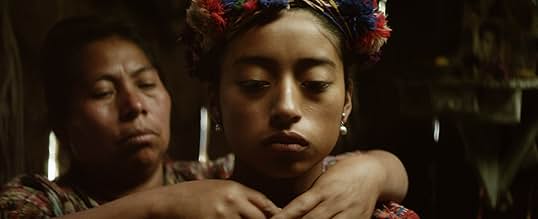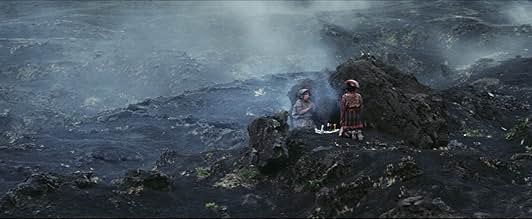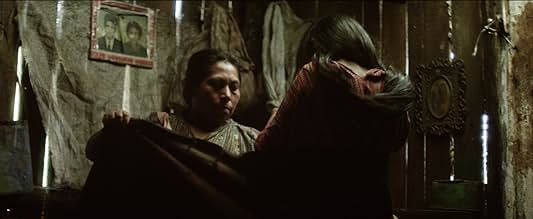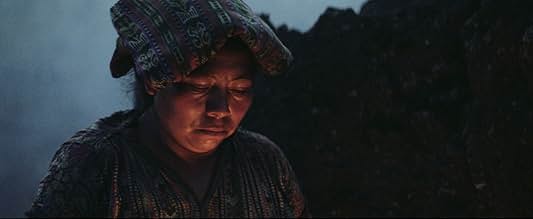AVALIAÇÃO DA IMDb
7,1/10
3,4 mil
SUA AVALIAÇÃO
Nas encostas de um vulcão ativo na Guatemala, seus pais Kaqchikel arranjam um casamento para Maria de dezessete anos.Nas encostas de um vulcão ativo na Guatemala, seus pais Kaqchikel arranjam um casamento para Maria de dezessete anos.Nas encostas de um vulcão ativo na Guatemala, seus pais Kaqchikel arranjam um casamento para Maria de dezessete anos.
- Direção
- Roteirista
- Artistas
- Prêmios
- 23 vitórias e 24 indicações no total
Avaliações em destaque
Ixcanul is a cinematic chef-d'oeuvre that sheds light on the plight of many indigenous Guatemalans who suffer from almost unfathomable levels of economic, social, and political exploitation. The film has many heart-breaking moments where the powerlessness of the film's protagonists comes through in a way that feels deeply real and authentic. One of the most interesting aspects of this films is that it is the first feature film created in Kaqchikel, one of the many indigenous Mayan languages of Guatemala. The actors are all native speakers of Kaqchikel, and the filmmakers overcame significant difficulties to assemble the cast that they did. The fact that the actors are so inexperienced makes the film all the more incredible because it did not at moment seem faked, at least for me. I would also like to address some of the criticism that has been levelled at the film and the filmmakers. The problem of orthography, that the title uses a c instead of a k, following modern (instead of colonial) spelling conventions, seems like minutiae compared to all of the positive work the film does in raising awareness of many of the problems indigenous Guatemalans face on a routine basis. Many also say the film only reinforces stereotypes about indigenous peoples in Guatemala and in the Americas more broadly. In that for many people this film will be their first exposure to contemporary Mayans, there is a risk of Ixcanul becoming a single story that defines an entire people. But it is the choice of the spectator to determine whether or not he/she will extrapolate stereotypes about an entire people from the portrayal of one family in one village at one specific point in time. However, if you look beyond these somewhat valid criticisms, you will see a cinematic masterpiece that will make you look at the world in a different way.
For a Mayan family of three living on misty and sable volcano slopes, snakes come in both reptile and human form. Blessings are bestowed upon the family as well. 17 year old Maria dreams of life on the other side of the volcano. This place she dreams of, stretching from the other side of the volcano, across all of Mexico and into the United States, is nowhere that anyone she knows has ever been. Yet her pleasant life picking coffee, cooking and taking care of farm animals is too sedate for her. She intends to bolt from an arranged marriage with her father's boss. In doing so she sets herself up for confrontations between needs; company and independence, city and country, adventure and stability, Mayan and Spanish, and more. In this struggle the real character of Maria will become more apparent.
If exquisite cinematography is your thing, you will like this unlikely yet appealing pairing of Guatemala and France. The acting is more convincing for the local talent, for even the best actors in the world would not make convincing Mayans. Kaqchikel is the film language. Ixcanul is available by Netflix snail mail delivery, a delivery that matches the gentle and pleasing pace of the film.
If exquisite cinematography is your thing, you will like this unlikely yet appealing pairing of Guatemala and France. The acting is more convincing for the local talent, for even the best actors in the world would not make convincing Mayans. Kaqchikel is the film language. Ixcanul is available by Netflix snail mail delivery, a delivery that matches the gentle and pleasing pace of the film.
With beautiful cinematography and art directon, and a well directed first-time casting, the film tells a story held in a traditional Mayan Kaqchikel community who worships nearby volcano, avoids the snakes that live there, and is exploited by greedy employers in a coffee plantation. María has been promised to marry the foreman of the plantation. However, not only she does not want it, but also is sexually excited in her virgin teen age and is attracted to Pepe. The latter is a drunkard who dreams about fleeing to the United States, where he expects everything is better than in Guatemala countryside. Well, then there is a well built drama, which explores where Kaqchikel rural and indigenous culture. Harsh reality is interwined with magic, the sadness of unsafe uncertainty faces the happiness of life.
Often times in Guatemala, you go watch a Guatemalan film solely for the sake of supporting your country. Ixcanul didn't feel that way, it is truly a film that transcends its origins and offers a story that feels universal. The story tackles topics such as agriculture, arranged marriages, pregnancy, among others. The film has a stunning cinematography and direction, which was quite impressive, some scenes do make use of the shaky camera method, which within context of what's happening in the film kind of make sense, however, they may feel a bit "out of place" considering the attention to detail that the rest of the film has.
Although all of the actors are debuting in this film, the acting is stellar, particularly from María Telón who commands the film and really delivers some of it's most powerful and emotionally effective scenes. In some instances, the actors don't need to speak for you to understand their feelings, almost like a silent picture. The Spanish-speaking actors are the only ones that I felt lacking, but their parts are minimal and are hardly detracting to the film.
Overall, Ixcanul is an eye-opener to people who are not familiar with the sad realities that the Kaqchikel people have to go through. It's the first film made in Guatemala that feels thought out, as well as culturally important and significant.
Although all of the actors are debuting in this film, the acting is stellar, particularly from María Telón who commands the film and really delivers some of it's most powerful and emotionally effective scenes. In some instances, the actors don't need to speak for you to understand their feelings, almost like a silent picture. The Spanish-speaking actors are the only ones that I felt lacking, but their parts are minimal and are hardly detracting to the film.
Overall, Ixcanul is an eye-opener to people who are not familiar with the sad realities that the Kaqchikel people have to go through. It's the first film made in Guatemala that feels thought out, as well as culturally important and significant.
A beautiful film that very much transports the viewer to the struggles of a girl coming of age and working on a coffee plantation with her parents at the foot of a volcano in Guatemala. The cinematography is gorgeous, the story is heartfelt, and the performances all feel truly authentic. I thank Letterboxd user Muffintree for his suggestion to watch this film, and would recommend it to others as well.
It's clear early on that we're being plunged into a world without the luxury of pretense, where eating pork doesn't mean going in to the air-conditioned market and buying a neatly packaged cut of bloodless pink meat, and living with one's parents doesn't mean being able to pretend they don't have sex, since everyone sleeps in the same room. In this world coffee beans are tediously picked by hand, and workers (who speak indigenous Kaqchikel) are exploited by owners (who also speak the language of the ruling class, Spanish). The owners know that the laborers have few opportunities, and also run a bar where the workers might run up an alcohol tab that erases the earnings they receive from a careful weighing of the beans they've picked. All of this is so that affluent people in far-off lands like America can sip a gourmet brew, made to order by a person with a college degree in English Lit and getting a paltry minimum wage, but I digress.
The daughter (the soulful María Mercedes Coroy) has been betrothed to her father's boss, the foreman of the plantation, a situation that might improve her family's situation. Unfortunately she's more attracted to a field worker who dreams of running away to America to escape the poverty of his life in Guatemala, and drinks to excess maybe to escape it in another way. The way the parents (María Telón and Manuel Manuel Antún) support the daughter is amazing, despite the decisions she makes which have disastrous consequences. The mother-daughter bond is truly special and seems eternal, and I imagined it representing a link which must stretch back generations upon generations into the past. It was also pretty cool to see the father not erupt into anger, instead calmly accepting what happened as if a weather conditions had caused a bad crop one year. Nothing is romanticized here, but the film shows the family bond and perseverance in the face of a hard life, starting with accepting each other.
It's clear early on that we're being plunged into a world without the luxury of pretense, where eating pork doesn't mean going in to the air-conditioned market and buying a neatly packaged cut of bloodless pink meat, and living with one's parents doesn't mean being able to pretend they don't have sex, since everyone sleeps in the same room. In this world coffee beans are tediously picked by hand, and workers (who speak indigenous Kaqchikel) are exploited by owners (who also speak the language of the ruling class, Spanish). The owners know that the laborers have few opportunities, and also run a bar where the workers might run up an alcohol tab that erases the earnings they receive from a careful weighing of the beans they've picked. All of this is so that affluent people in far-off lands like America can sip a gourmet brew, made to order by a person with a college degree in English Lit and getting a paltry minimum wage, but I digress.
The daughter (the soulful María Mercedes Coroy) has been betrothed to her father's boss, the foreman of the plantation, a situation that might improve her family's situation. Unfortunately she's more attracted to a field worker who dreams of running away to America to escape the poverty of his life in Guatemala, and drinks to excess maybe to escape it in another way. The way the parents (María Telón and Manuel Manuel Antún) support the daughter is amazing, despite the decisions she makes which have disastrous consequences. The mother-daughter bond is truly special and seems eternal, and I imagined it representing a link which must stretch back generations upon generations into the past. It was also pretty cool to see the father not erupt into anger, instead calmly accepting what happened as if a weather conditions had caused a bad crop one year. Nothing is romanticized here, but the film shows the family bond and perseverance in the face of a hard life, starting with accepting each other.
Você sabia?
- CuriosidadesThe film was selected as the Guatemalan entry for the Best Foreign Language Film at the 88th Academy Awards but was not nominated.
- Trilhas sonorasMala Mujer
[from the albumLos Mejores Éxitos Bailables Vol. 2. Música de Guatemala"]
Performed by Fidel Funes Y Su Marimba Orquesta
Written by Fidel Funes
Published by Edifosa
Courtesy of Difosa
Principais escolhas
Faça login para avaliar e ver a lista de recomendações personalizadas
- How long is Ixcanul?Fornecido pela Alexa
Detalhes
- Data de lançamento
- Países de origem
- Centrais de atendimento oficiais
- Idiomas
- Também conhecido como
- Ixcanul
- Locações de filme
- Empresas de produção
- Consulte mais créditos da empresa na IMDbPro
Bilheteria
- Faturamento bruto nos EUA e Canadá
- US$ 295.157
- Faturamento bruto mundial
- US$ 594.836
- Tempo de duração1 hora 33 minutos
- Cor
- Proporção
- 2.35 : 1
Contribua para esta página
Sugerir uma alteração ou adicionar conteúdo ausente





















